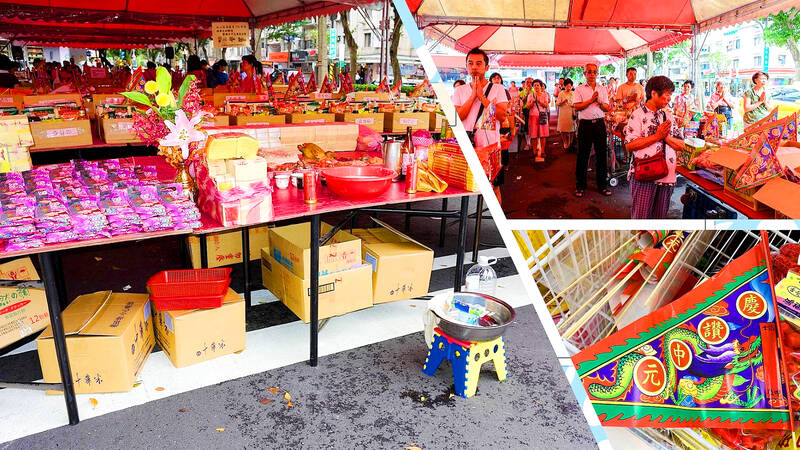對話 Dialogue
清清:這個禮拜天是中元節,你們家要不要拜拜?
Qīngqing: Zhège lǐbàitiān shì Zhōngyuán jié, nǐmen jiā yào búyào bàibai?

Photo courtesy of Wikimedia commons 照片:Wikimedia commons 提供
華華:我們家農曆七月初一鬼門開就拜了,七月十五中元節當天,當然也要拜啊!
Huáhua: Wǒmen jiā nónglì qī yuè chūyī guǐmén kāi jiù bàile, qī yuè shíwǔ Zhōngyuán jié dāngtiān, dāngrán yě yào bài a!
清清:我還沒買好供品和金紙,這兩天要趕快準備了。
Qīngqing: Wǒ hái méi mǎihǎo gòngpǐn hé jīnzhǐ, zhè liǎng tiān yào gǎnkuài zhǔnbèile.
華華:你可以上網買啊!網路上各大通路都有整組的商品,而且大多都能快速到貨,省了很多麻煩。
Huáhua: Nǐ kěyǐ shàngwǎng mǎi a! Wǎnglùshàng gèdà tōnglù dōu yǒu zhěng zǔ de shāngpǐn, érqiě dàduō dōu néng kuàisù dàohuò, shěngle hěn duō máfán.
清清:唉!華人的鬼月一次就是一整個月,跟西方的鬼節只有萬聖節一天真不一樣,要注意的事好多,還會讓人感到害怕。。
Qīngqing: Ai! Huárén de Guǐyuè yícì jiùshì yì zhěngge yuè, gēn xīfāng de guǐjié zhǐyǒu Wànshèng jié yì tiān zhēn bù yíyàng, yào zhùyì de shì hǎo duō, hái huì ràng rén gǎndào hàipà.
華華:你就想現在是大夏天,不要去海邊、不要太晚回家什麼的,都是在提醒我們注意安全。
Huáhua: Nǐ jiù xiǎng xiànzài shì dà xiàtiān, búyào qù hǎibiān, búyào tài wǎn huíjiā shénme de, dōu shì zài tíxǐng wǒmen zhùyì ānquán.
清清:對啦!而且聽說中元節最早是來自「目蓮救母」的故事,主要的意義是孝順,這樣想就不那麼可怕了。
Qīngqing: Duì la! Érqiě tīngshuō Zhōngyuán jié zuì zǎo shì láizì “Mùlián jiù mǔ” de gùshì, zhǔyào de yìyì shì xiàoshùn, zhèyàng xiǎng jiù bú nàme kěpàle.
華華:「不做虧心事,不怕鬼敲門。」放心,你沒做壞事,一定都平安!
Huáhua: “Bú zuò kuīxīnshì, búpà guǐ qiāo mén.” Fàngxīn, nǐ méi zuò huàishì, yídìng dōu píng’ān!
翻譯 Translation
Qingqing: This Sunday is the Ghost Festival. Is your family going to hold a ceremony?
Huahua: We held a ceremony on the first day of the seventh lunar month, when the gates of the Underworld opened. Of course, we’ll also have a ceremony on the Ghost Festival day itself, the fifteenth of the month.
Qingqing: I haven’t bought the offerings and joss paper yet. I need to get them ready in the next couple of days.
Huahua: You can buy them online. Major online platforms have complete sets, and most can be delivered quickly, saving you a lot of trouble.
Qingqing: Sigh. The Chinese Ghost Month lasts for an entire month: Western Halloween only lasts one day. There are so many things to be careful about, and it can be quite scary.
Huahua: Just think of it as being in the middle of summer. Don’t go to the beach, don’t come home too late, and so on. It’s all about reminding us to stay safe.
Qingqing: Yeah, and I heard that the Ghost Festival originally comes from the story of Mulian saving his mother. The main significance is filial piety, so thinking about it that way makes it less scary.
Huahua: “A clear conscience is not afraid of ghosts knocking at the door.” Don’t worry, if you haven’t done anything wrong, you’ll be safe.
生詞 Vocabulary
1. 鬼月 (Guǐyuè) Ghost Month
2. 中元節 (Zhōngyuán jié) The Ghost Festival
3. 供品 (gòngpǐn) offerings for prayer
4. 金紙 (jīnzhǐ) joss paper, ghost money
5. 通路 (tōnglù) marketing channel
6. 萬聖節 (Wànshèng jié) Halloween
7. 孝順 (xiàoshùn) filial piety
8. 虧心事 (kuīxīnshì) unconscionable act, shameful act, immoral actt
教材音檔 Audio Files
國立清華大學華語中心提供
By National Tsing Hua University Chinese Language Center:

A: When is the Lantern Festival? B: The festival is celebrated on the 15th day of the first month of the lunar calendar, which fell on Feb. 12 this year. A: Oh no! Did I miss the 2025 Taipei Lantern Festival? B: Yes, you did. But you can still go to the 2025 Taiwan Lantern Festival in Taoyuan, which will run until this Sunday. A: Let’s go admire the exuberant lanterns. A: 元宵節到底是哪一天? B: 就是農曆1月15日啊,今年則落在國曆2月12日。 A: 喔不,我是不是錯過了2025台北燈節? B: 是的,但你還可以去桃園的2025台灣燈會,活動將持續至週日。 A: 那我們去欣賞豐富的花燈秀吧! (By Eddy Chang, Taipei Times/台北時報張聖恩)

A: What’s the theme of the 2025 Taiwan Lantern Festival’s main lantern? B: The theme is “Paradise,” and the main lantern is a snake-shaped “infinity” symbol that features a lighting show every half an hour. A: Cool, I heard that there are over 300 lanterns. B: There are even giant lanterns in the shape of Pikachu and some other popular Pokemon characters. A: Let’s go now. A: 2025台灣燈會主燈的主題是什麼? B: 主題是「無限樂園」!主燈的造型則是蛇形的數學「無限號」,主燈每半小時還有一次燈光秀。 A: 酷喔,聽說總共有300多件花燈作品。 B: 甚至還有皮卡丘和其他熱門寶可夢角色的巨型花燈呢。 A: 哇我們現在就出發吧! (By Eddy Chang, Taipei Times/台北時報張聖恩)

本文由生成式AI協作,本刊編輯編修。 Tucked away in southwestern Taiwan, Yunlin County is a treasure trove of cultural heritage, rich history, and natural beauty. From its stunning temples and glove puppetry to historical architecture and picturesque landscapes, Yunlin rewards those who venture off the beaten path. Yunlin is renowned for its flourishing temple culture. Temples in this region are not merely places of worship but also communal centers where people gather for festivals, rituals, and social functions. One of the most notable temples here is the Beigang Chaotian Temple, which was built more than 300 years ago and is dedicated to Matsu, the sea

Nestled within the heart of Taipei, National Taiwan University (NTU) contains a grand and spacious sanctuary where nature and academia come together in perfect accord. Across its expansive 111-hectare campus, NTU reveals a landscape rich with history, lush greenery, and a thoughtfully preserved ecosystem. This tranquil haven invites visitors to take their time wandering among the elegant buildings, to admire the rare plants, and to experience a space that exudes quiet inspiration. Zhoushan Road: A Gentle Prelude to NTU’s Tranquility Beginning at Gongguan MRT Station, the enchanting avenue Zhoushan Road leads visitors into NTU shaded by golden rain trees, cottonwoods, and Javanese